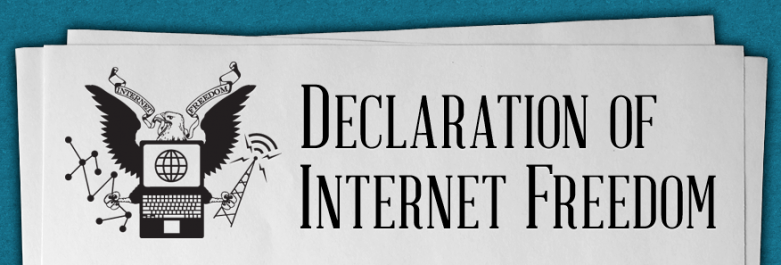
Declaration of Internet Freedom Translators Speak Out
On Monday we announced that the Global Voices-led “translathon” yielded a whopping 63 translations of the Declaration of Internet Freedom. Among the translated languages are K’iche’, Galician, Afghan Dari, Bengali, Estonian and Hebrew.
Now a bunch of the translators involved in the effort are offering their take on the process and the importance of the fight for Internet freedom in their countries. These are some of the greatest testaments to the free and open Internet we’ve seen in a long time.
Andre Anciaes, who helped with the European Portuguese translation, writes:
I volunteered because I believe that a free Internet is the most reliable, powerful and effective way to make the world change, reminding governments and corporations that we, the people, are in charge, and that our voice will be heard if they forget they exist for the people, and not the opposite.
The need for true freedom of speech motivated professional translator Mukesh Lama, who volunteered to contribute to the Nepali translation:
I decided to translate the declaration because I did not want my community to be isolated from the world bank of information. Translation of this declaration into the Nepali language will have a great impact on the use of the Internet for the freedom of expression and freedom of use of the knowledge that human beings from all over the world have gathered since time unknown. I hope the Internet will not be censored by any government of the world in the future and also hope that anybody from all over the world can use the Internet to share knowledge without any hindrance.
Heiki Ojasild, a member of the Estonian Pirate Party, collaborated with others on the Estonian translation:
Members of the Estonian Pirate Party (I and Märt Põder) opted to translate this declaration because unlike other initiatives it is both simple and fair, and this declaration has the backing of well-known civil liberties organizations like the ACLU and the Electronic Frontier Foundation.
Igor Yavych helped translate the Declaration into Ukrainian:
I decided to help in the translation of the Declaration because I believe the Internet should be free and open; it should belong to the people and not any bought government. Since we’re now in a dire situation where some governments try to censor the Internet, it’s up to people like you and me to stop them. For that to happen, more people need to know this. I believe that translating the Declaration will help people to understand what the current situation is. It felt nice to know that I took part in something important like this.
Mariam Hovhannisyan helped produce the Armenian translation:
When I read the title “Declaration of Internet Freedom,” I thought it was not real, but later when I read the Declaration I had a great impulse to translate it into Armenian, because in our country I believe no one knew about such a declaration. It is amazing to see so many languages at one place around the unprecedented idea of the translathon. I am proud to see our combined efforts and … the popularity of the Declaration.
Several Global Voices staff members were involved in the “translathon.”
Renata Ávila is a Guatemalan lawyer and the leader of Creative Commons Guatemala. She organized the translation of the Declaration into several Mayan languages:
With enthusiasm three Mayan netizens, Roberto, Josefina and Arnulfo, engaged in the translation of the Internet declaration. For Mayan cultures and indigenous cultures in general, technology is not incompatible with their culture, as many might think; in fact a free Internet is a fundamental tool to preserve their languages, their culture, and access knowledge and share their vision of the world. Indigenous linguists are particularly excited about the opportunities the Internet offer to engage indigenous youth and teach them the written form of their languages, as often indigenous people know how to speak their languages but not how to write them.
Finally, we all owe a huge debt to Paula Góes, Global Voices’ online multilingual editor, who pulled together this fantastic project. She writes:
With the interconnectivity that the Internet allows us, language is perhaps one of the last barriers that separate humanity. I get excited every time this barrier is broken a little bit, so it made me very happy to see the Global Voices Lingua Project joining forces with Internet users from all over the world to make the Declaration of Internet Freedom available in 63 languages — and counting!
If you care about the fight to protect the open Internet, please consider a donation to the Free Press Action Fund.